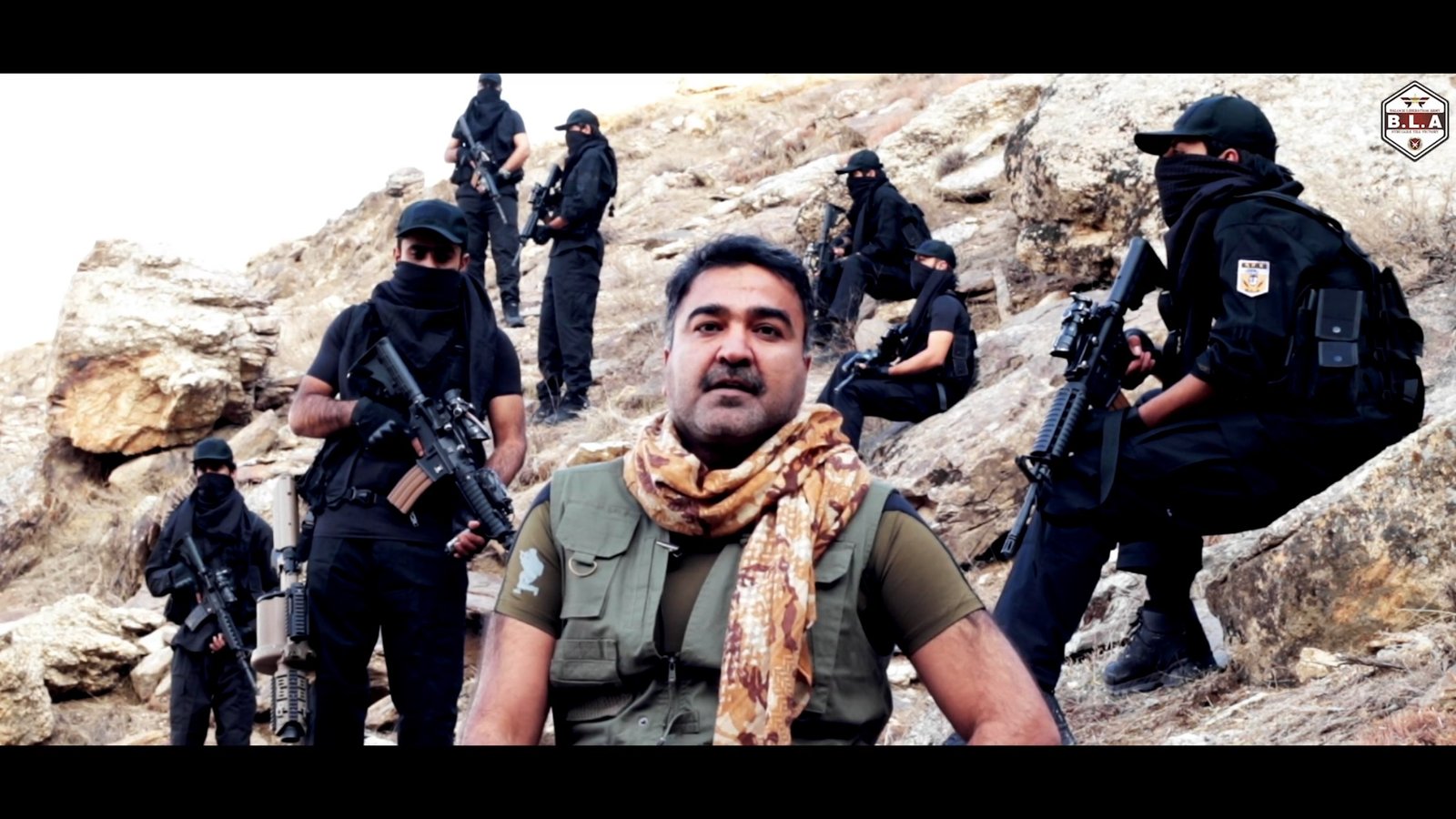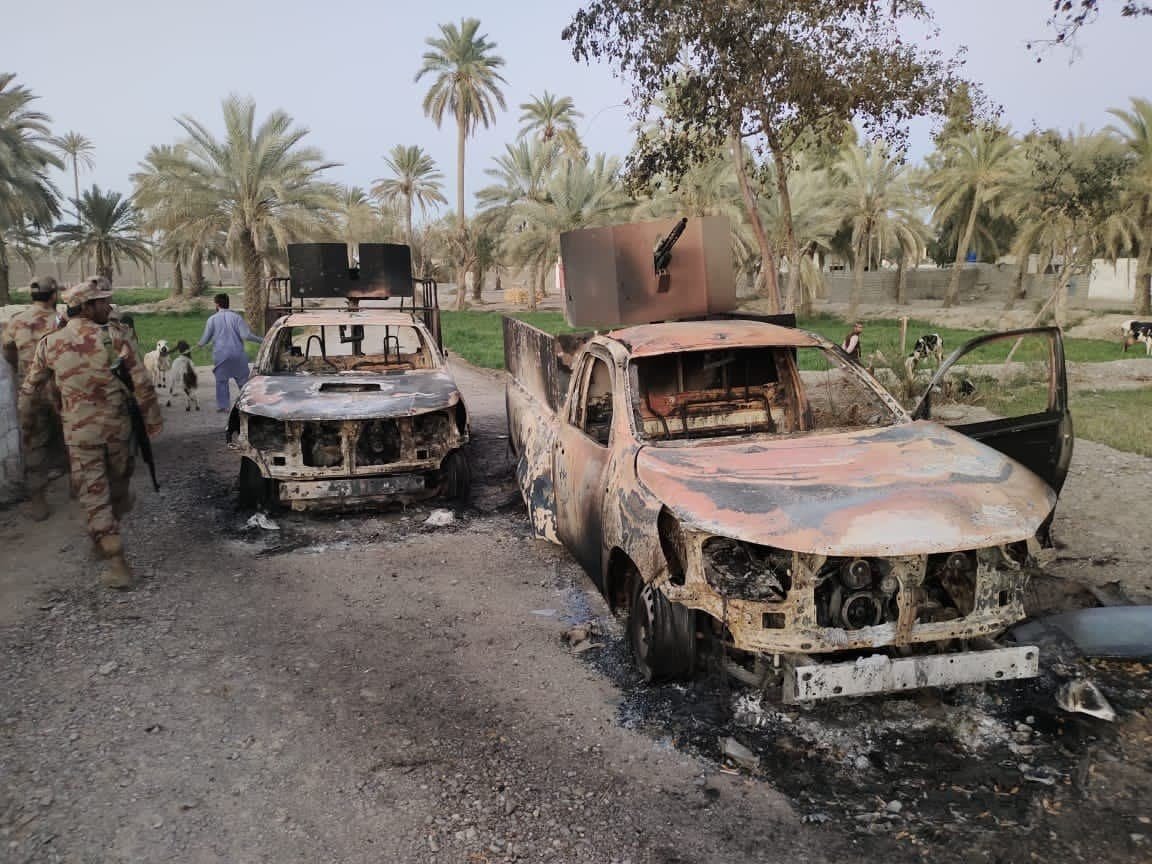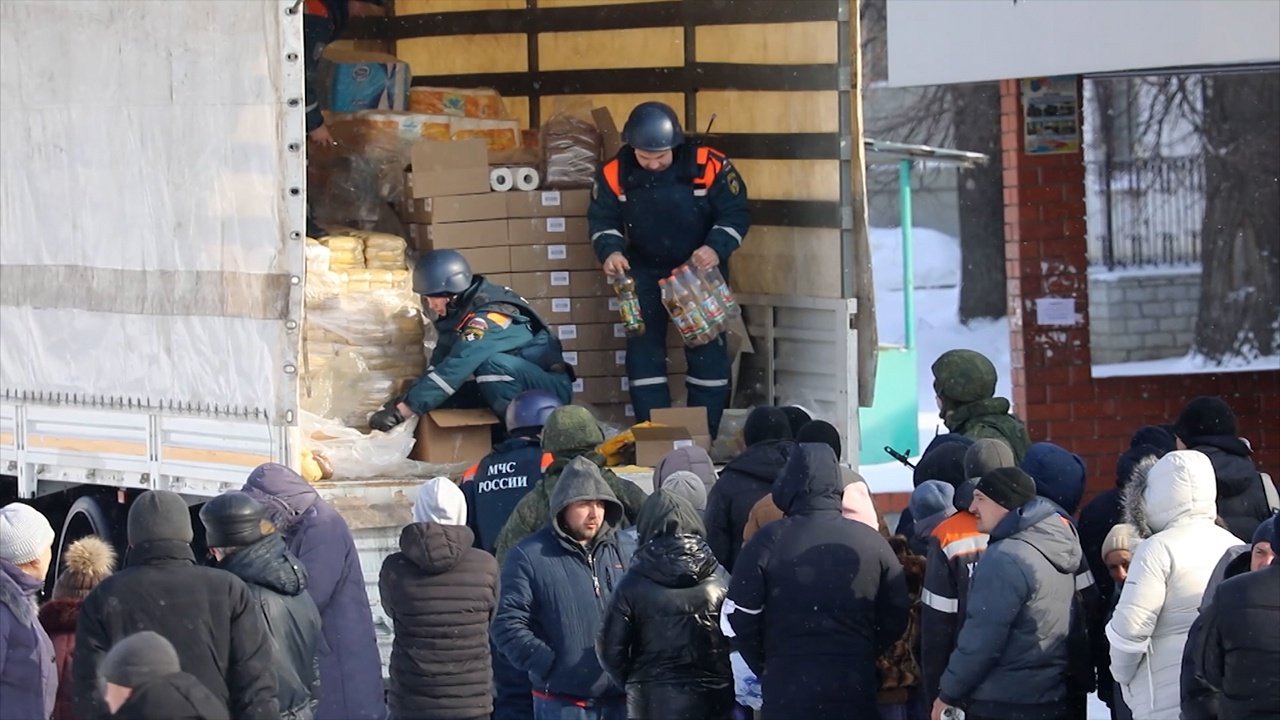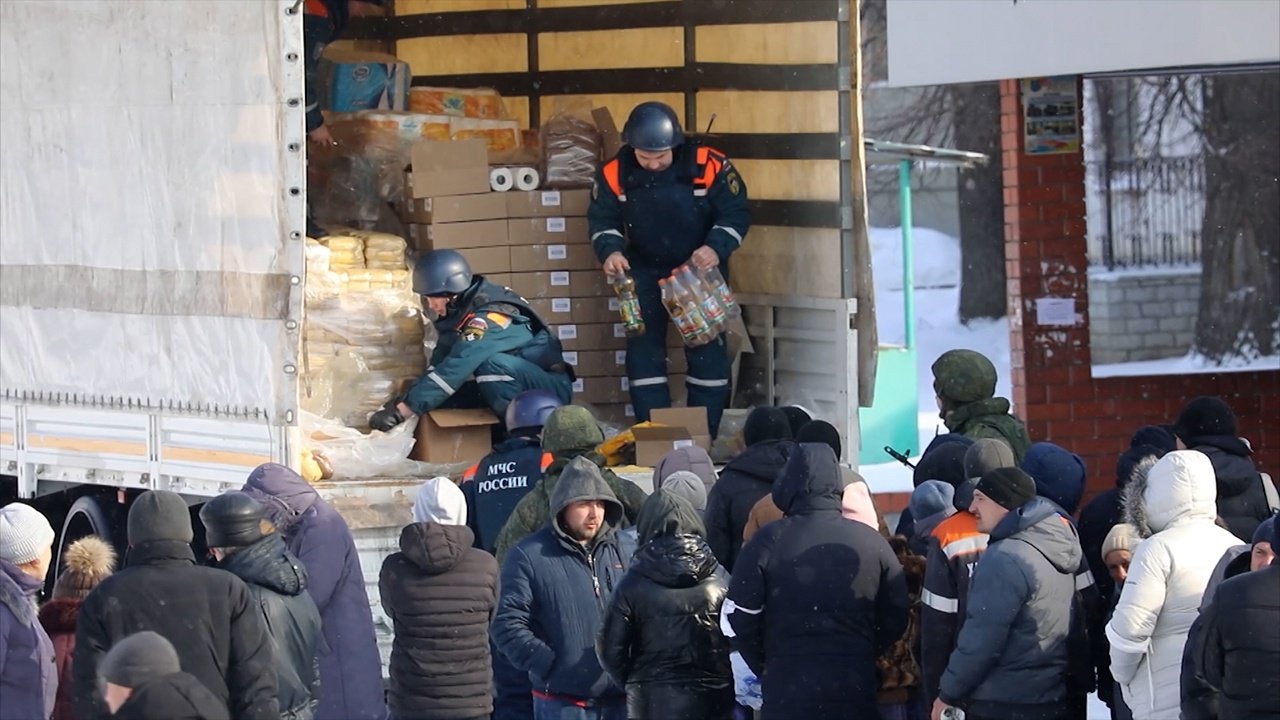Pakistan is using Cluster Bombs to target Civilians. As per OSINT sources and weapons experts, The Cluster Bomb pictures published in Pakistani Newspapers recently are established to be of Pakistani Origin. This raises an ugly possibility of Pakistan using illegal weapons against its own people to gain sympathy of the world. Our analysis in consultation with Weapons experts and OSINT sources, nails the lie of Pakistan and its conspiracy to blame India for the same.
Pakistani Lies Nailed
Recently, Pakistan accused Indian army of allegedly using cluster bombs to target civilians along LoC in PoK. Thousands of Pakistani ISPR paid trolls made a lot of noise on social media accusing India.
This incident came into limelight after Indian government decision of abrogation of Art. 370. We covered the details about abrogation of Article 370 of Indian Constitution by Indian Government and the resultant Peace and celebrations it brought among people of Jammu and Ladakh regions and the situation is under control in Kashmir region which forms only 16% of the entire erstwhile state of Jammu & Kashmir. Here are the links to the articles for reading:-
Celebrations In Jammu & Kashmir, Protests In Pakistan As Article 370 Indian Constitution Abrogated
Post Abrogation Article 370 – Life In Jammu, Kashmir And Ladakh
Kashmir Remained Peaceful On Eid, Life Normal Jammu Ladakh Regions
Pakistani foreign minister, Shah Mehmood Qureshi on 3rd August 2019 tweeted, ‘Strongly condemn the blatant use of cluster ammunition by Indian Security Forces targeting innocent civilians along the Line of Control. This is clear violation of the Geneva Convention & International Laws.’
However Indian army and Indian government has refused the use of cluster bombs, as it is banned under its ‘ India Cluster Munition Ban Policy’.
After this tweets and articles flooded the news channels, demanding actions against India.
A similar article was by ‘Dawn’ a Pakistani news channel which included some pictures of Cluster bombs alleged to be used by Indian army.
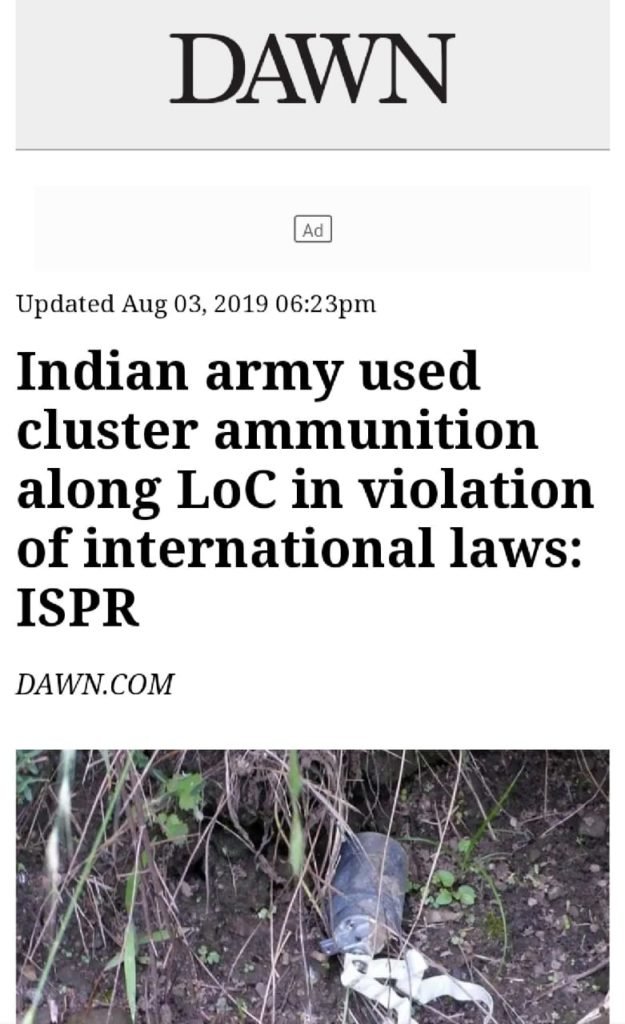
As per ammunition experts, the alleged Submunition is actually M42 used in M483a1 projectile. This projectile is used to deliver sub missiles dual purpose armor defeating and antipersonnel grenades.

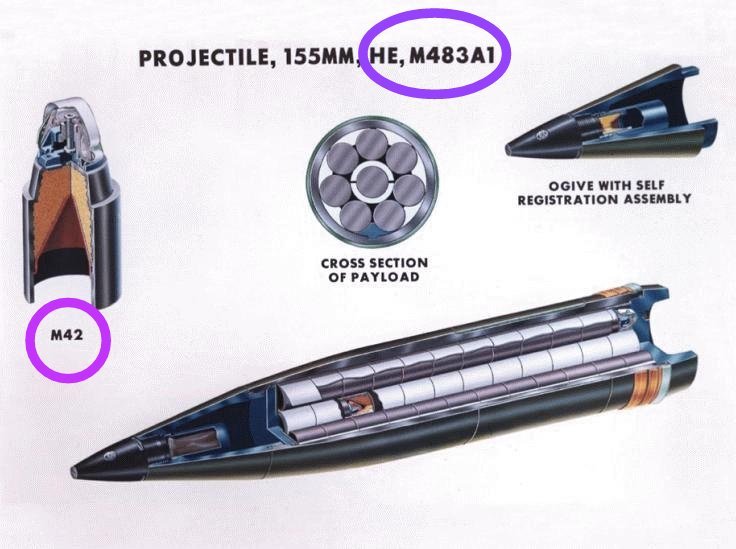
This projectile is of the separate loading type. The fuze, propelling charge, and primer are handled and loaded separately. The projectile is provided with a fusible lifting plug in place of a fuze for handling. The lifting plug may be the yellow fusible type or the universal type. The plug must be replaced by a fuze before the projectile is loaded. The projectile contains a total of 88 dual-purpose grenades (64 M42 and 24 M46). The grenades are contained by a base plug, with a left-hand thread which is screwed into the base of the projectile. For normal usage, the expulsion charge is contained in a cavity in the nose of the projectile to eject the grenades. The expulsion charge can be a bagged expulsion charge assembly or the cylindrical plastic expulsion charge type. If desired, this expulsion charge may be replaced by a spotting charge designated to detonate the entire projectile as if it were a bulk-loaded HE projectile. The metal rotating band near the base of the projectile is protected during storage and handling by a removable plastic grommet.

The M42 grenades shown in pictures are dual purpose (DP), high explosive (HE) grenades containing a shaped main charge and incorporating an impact inertia fuze. The grenade is stabilized, and the fuze is armed in flight, by a ribbon stabilizer. These grenades are armor-defeating, antipersonnel submunitions delivered by projectile or rocket warhead.
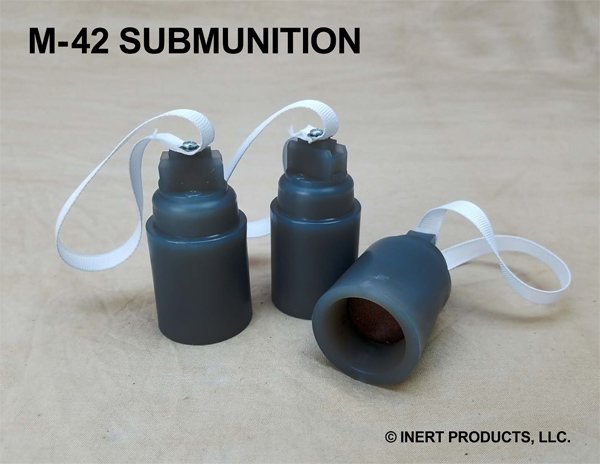
The M42 and M46 ribbon stabilizer is folded over the fuze body and held by a stiffener before dispersal. When installed in the MLRS warhead, the M77 grenade will have a plastic slider cap over the fuze body before dispersal. The M46 grenade differs from the M42 and M77 in having a heavier, thicker body with a smooth inner wall.
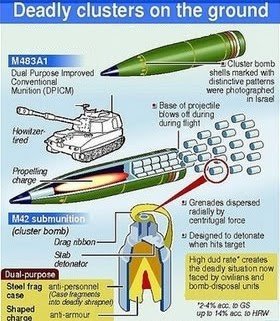
The M483a1 is manufactured by US, Pakistan, Turkey, Germany and is currently in service in Bahrain, Greece, Israel, Jordan, S. Korea, Morocco, Pakistan, Turkey and U.S.
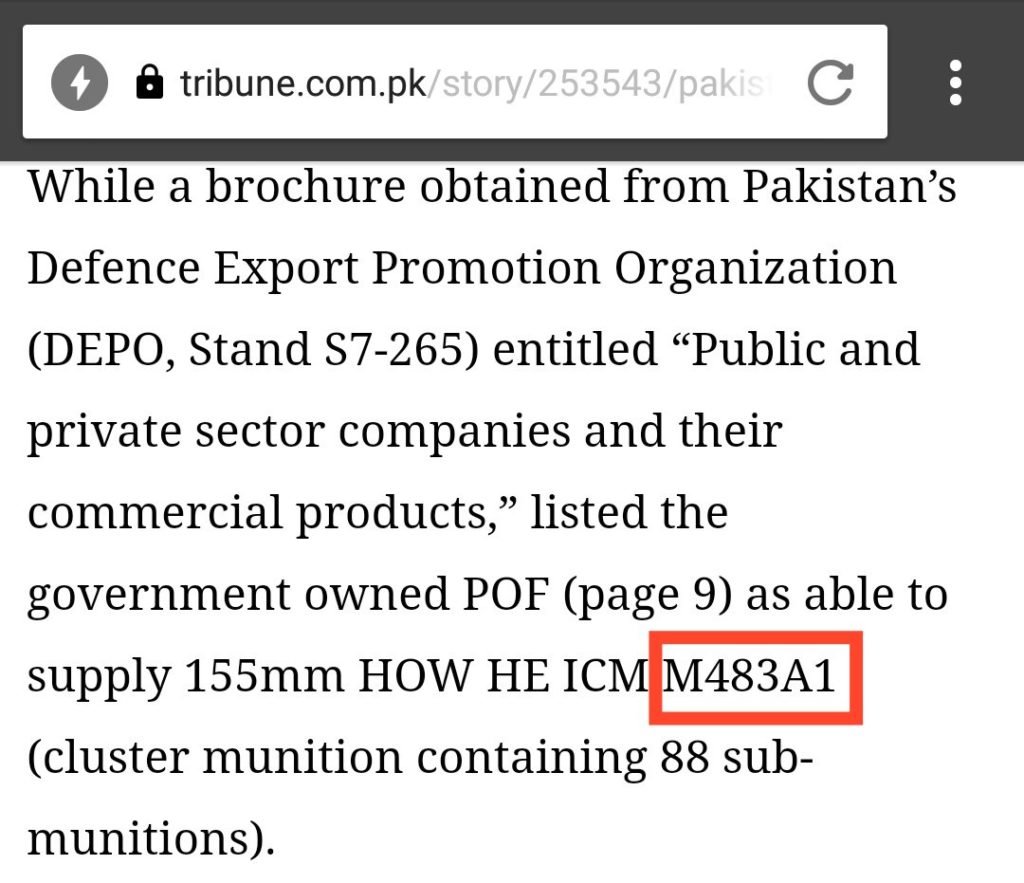
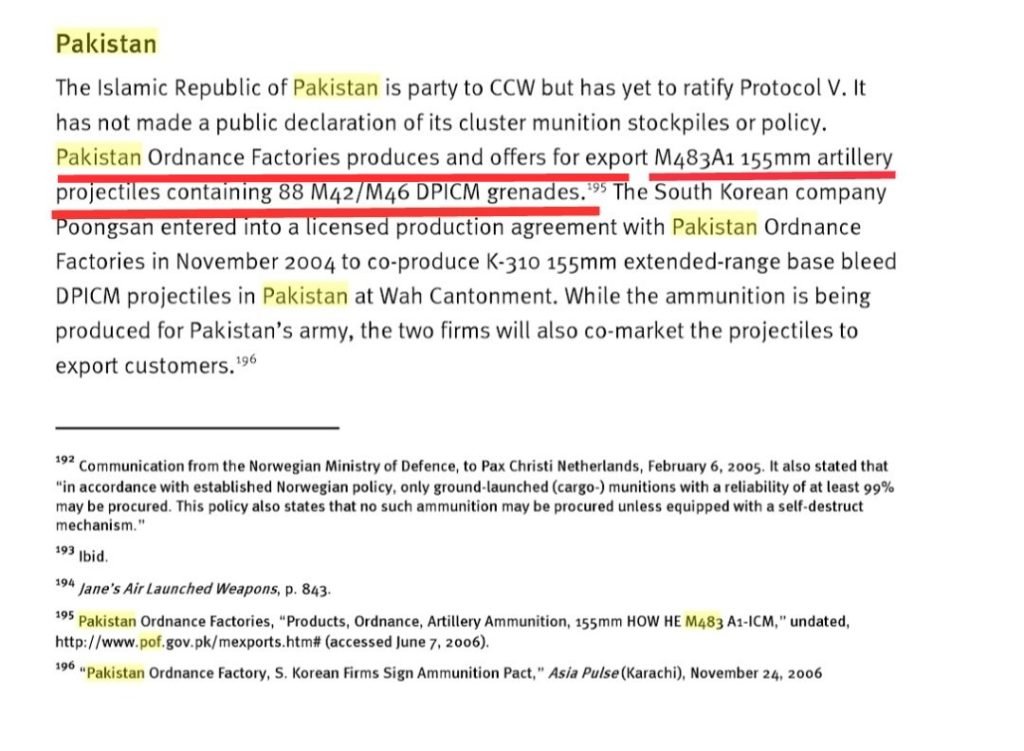
Pakistan’s non-signing of any Cluster Ban Treaties, Usage and Export of Cluster Munition
In a report published by Landmine and Cluster Munition Monitor, on 03 July 2018, a report on Pakistan Cluster Munition Ban Policy was published. As per the report, “Non-signatory Pakistan acknowledges the harm caused by cluster munitions but views them as legitimate weapons that should not be banned.”
“Pakistan produces cluster munitions and has likely exported them. It has not disclosed information on its stockpile of cluster munitions. Pakistan states that it has never used cluster munitions, but it has participated in a Saudi Arabia-led military operation in Yemen that has used cluster munitions since March 2015.”
“In October 2017, Pakistan reiterated its opposition to treaties concluded outside the UN framework and said that cluster munitions should be negotiated via the Convention on Conventional Weapons (CCW).”
Pakistan has often done the lip service & for namesake, recognized the serious humanitarian consequences caused by the “indiscriminate use” of cluster munitions and welcomed “efforts to mitigate their negative consequences,” but views cluster munitions as legitimate weapons with military utility.
Pakistan participated as an observer in the First Review Conference in Dubrovnik, Croatia in September 2015, where it expressed support for “international efforts to address the issue of irresponsible and indiscriminate use of cluster munitions,” but affirmed that “Pakistan considers cluster munitions as legitimate weapons with recognized military value in our regional context.”
In October 2017, Pakistan told the UN General Assembly (UNGA) First Committee on Disarmament and International Security that it would again abstain from the vote on a UNGA resolution that calls on states outside the Convention on Cluster Munitions to “join as soon as possible” because, Pakistan said, “we consider cluster munitions to be legitimate weapons with recognized military utility.”
That comment is repeated in previous statements by Pakistan in 2015 and 2016 upon abstaining from the previous UNGA resolutions promoting implementation of the convention.
Pakistan Producing Cluster munition and Cluster bombs
Pakistan has produced ground-delivered cluster munitions and air-dropped cluster bombs.
State-owned Pakistan Ordnance Factories (POF) has produced and offered for export M483A1 155mm artillery projectiles containing 88 M42/M46 dual-purpose improved conventional munition (DPICM) submunitions. South Korean company Poongsan entered into a licensed production agreement with POF in 2004 to co-produce K-310 155mm extended-range DPICM projectiles in Pakistan at Wah Cantonment. At the time the projectiles were produced for Pakistan’s armed forces, but both firms also said they would co-market the projectiles for export. “Pakistan Ordnance Factory and Korean Firm Sign Ammunition Pact,” Asia Pulse (Karachi), 24 November 2006 (available on YouTube). Video taken in Pakistan Ordinance Factory has images of Poongsan machinery for the manufacturing of DPICM shells. 12-April 2008
The Pakistani army took delivery of the first production lots in 2008 as per the news published Pak army gets first lot of DPICM Ammunition
In September 2011, the London-based arms expo Defence & Security Equipment international (DSEi) closed the POF stand and Pakistan’s Defence Export Promotion Organisation pavilion after promotional material was found at both locations listing the 155mm extended range (base bleed) DPICM cluster munition available for sale. This included the 155mm extended-range (base bleed) DPICM projectiles containing 45 submunitions and the 155mm M483A1 cluster munition containing 88 submunitions, both manufactured by POF. The United Kingdom (UK) is a State Party to the Convention on Cluster Munitions so the references to equipment were found to breach UK Government Export Controls and DSEi’s contractual requirements.
As per article published in Tribune, London exhibition controversy: Pakistan says no brochures listed cluster munitions, Pakistani authorities reportedly said the cluster munitions were not offered for sale by Pakistan at DSEi.
As per an the report published by parliament.uk “Strategic Export Controls”, Similar concerns were raised when POF advertised the same 155mm DPICM cluster munition during the 2009 DSEi arms fair.
We reported to the Committee in December 2009 that, at the Defence Systems and Equipment International Exhibition (DSEi) held in September 2009 in London, the UKWG found that Pakistan Ordnance Factories (POF) was advertising artillery ammunition including its 155mm Base Bleed DP-ICM (Dual Purpose Improved Conventional Munition)-a cluster munition-in its product brochures. At the time of the exhibition, the organizers were contacted about these promotional materials and an investigation launched as to whether the exhibitor was in breach of its obligations. At the time of writing, the outcome of this investigation is unknown.
Jane’s Information Group reports that the Pakistan Air Weapons Center produces the Programmable Submunitions Dispenser (PSD-1), which is similar to the United States (US) Rockeye cluster bomb and dispenses 225 anti-armor submunitions. Jane’s Information Group states that the Pakistan National Development Complex produces and markets the Hijara Top-Attack Submunitions Dispenser (TSD-1) cluster bomb. It lists the Pakistan air force as possessing BL-755 cluster bombs. [Reference: Robert Hewson, ed., Jane’s Air-Launched Weapons, Issue 44 (Surrey, UK: Jane’s Information Group Limited, 2004), pp. 389 & 843. BL-755s were manufactured by the UK.]
The US transferred 200 Rockeye cluster bombs to Pakistan at some point between 1970 and 1995. [Reference: US Defense Security Cooperation Agency, Department of Defense, “Cluster Bomb Exports under FMS, FY1970–FY1995,” 15 November 1995, obtained by HRW in a Freedom of Information Act request, 28 November 1995.]

As an interim step towards acceding to the convention, Human Rights Watch has urged Pakistan to institute a prohibition on the transfer of cluster munitions, as it has done with a long-standing export moratorium on antipersonnel landmines.
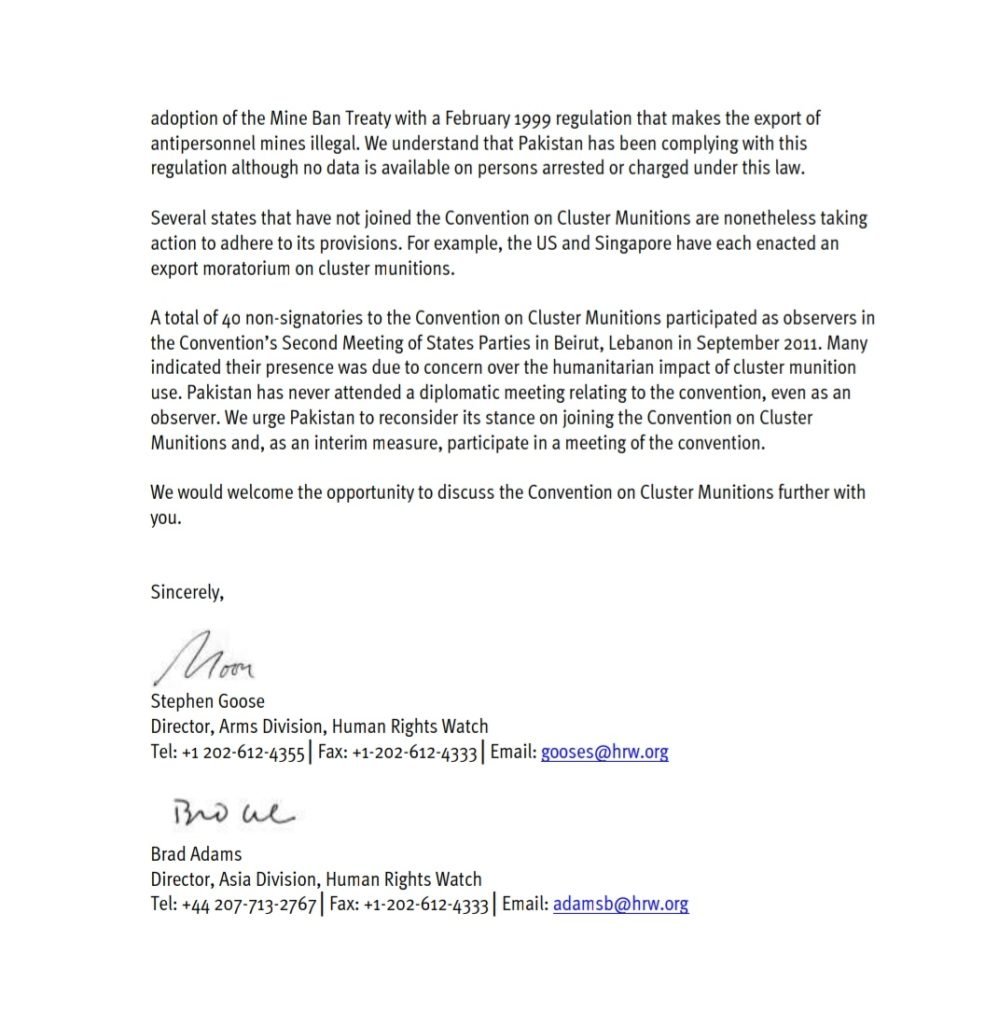
In June 2015, a government representative informed the Monitor that there are no plans to put in place an export moratorium on cluster munitions. [Reference: Monitor interview with Ifran Mahmood Bokari, Permanent Mission of Pakistan to the UN, Geneva, 23 June 2015.]
There is no public information available on the numbers of cluster munitions stockpiled by Pakistan, and limited information on types.
Pakistan has lied at the UN, stated several times that it has never used cluster munitions and Landmines
Since March 2015, Pakistan has participated in a Saudi Arabia-led joint military operation in Yemen against Houthi forces, also known as Ansar Allah, which has used cluster munitions. Pakistan has not commented on evidence that the Saudi-led coalition has used cluster munitions in Yemen, while a December 2016 statement by the coalition forces did not deny the use of cluster munitions and argued that “international law does not ban the use of cluster munitions.”
First, International law does not ban the use of cluster munitions. Some States have undertaken a commitment to refrain from using cluster munitions by becoming party to the 2008 Convention on Cluster Munitions. Neither the Kingdom of Saudi Arabia nor its Coalition partners are State Parties to the 2008 Convention, and accordingly, the Coalition’s use of cluster munitions does not violate the obligations of these States under international law. Second, the Coalition has conducted an inquiry into the use of cluster munitions in Yemen, including through dialogue with the British authorities and others. It has become apparent that there was limited use by the Coalition of the UK-manufactured BL-755 (also possessed by Pakistan) cluster munitions in Yemen. Read: Coalition Forces supporting legitimacy in Yemen confirm that all Coalition countries aren’t members to the Convention on Cluster Munitions
As it is clear from above, cluster Submunition belongs to Pakistan. Pakistan Army mouthpiece peddled lies to frame India. Their one lie gave lease of life to the failed ruling party PTI led by Imran Khan. All the Ministers started shouting alleging India used Cluster bombs, whereas the real culprit was Pakistan itself. Pakistan used Cluster munition on Kashmiris in Pakistan Occupied Kashmir and used the images of the victims to frame India. However, their Lie again got caught.
There is a growing condemnation on Social Media against Pakistani action. There is a growing demand on social media to try the Pakistan Army Generals in International Court of Justice for war crimes and cluster bombs and landmines used to target Ethnic groups of Pashtuns, Baloch.
Genocide of Pashtun, Baloch people by Pakistan Army by using Landmines and Cluster Bombs
Manzoor Pashteen (who is regarded as the Modern Day Gandhi) has started The Pashtun Tahafuz Movement (PTM) to appeal to the Pakistan government to remove the landmines from the civilian areas. It should be noted that in May 2019, PTM was running a peaceful, non-violent, Gandhinian protest march when Pakistan Army opened firing on the unarmed civilians and killed over 50 civilians and injuring 100 civilians.
peaceful protest when Pakistan Army started firing at the civilians.
In the video you can see Ali Wazir, an elected MNA Politician with garlands around his neck was walking with Civilians, unarmed in the peaceful protest when Pakistan Army started firing at the civilians.
Shooting Civilians
Instead of trying Pakistan Army officers of war crime and killing civilians, Ali Wazir and Mohsin Dawar were taken into custody and charged with Anti-National activities. Both the elected Politicians are still in Jail and suffering atrocities of Pakistan Army. Any opposition party or any person whoever raises his voice or questions Pakistan Army actions in any part of Pakistan is disappeared and killed. As of date over a million Pashtun, Baloch, Muhajirs, Sindhis, Ahamadiyas, Hazaras, Hindus and Christians have been disappeared by Pakistan Army and no records of their arrest are shown. Pakistan Army is also accused of selling these abducted persons for Organ Harvesting and killing them and dumping their bodies in mass graves.
Recently Manzoor Pashteen released some pictures of women and children who had fallen victims of Land Mines in the civilian areas.
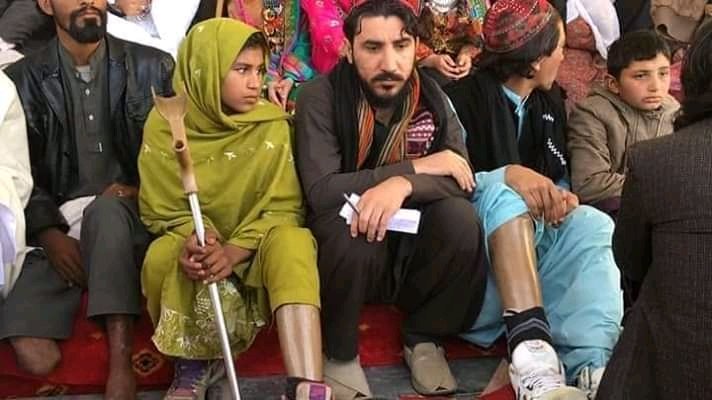
Pakistan Army has failed to provide any reasons or logic for installing Landmines in civilian areas and why they are not clearing the land mines.
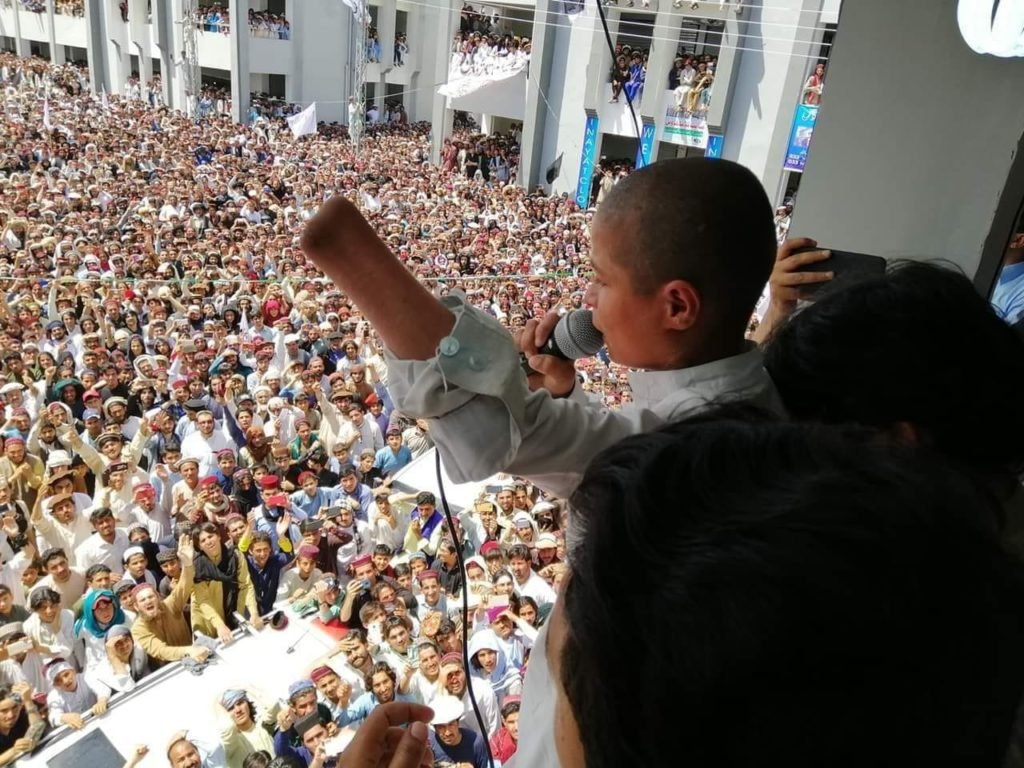
As per people, it is a Punjabi Dominated Pakistan who hates all other ethnic groups and want to eliminate everyone. That is the reason the Freedom movement in Balochistan has started against the repressive state of Pakistan. Similarly, there are growing voices of freedom in Khyber Pakhtunkhwa to break away from repressive Pakistan. Some want an Independent Pashtunistan while many advocates for merging Pashtun territories with Afghanistan. Similarly, there are growing voices of Independence of Sindhudesh and Muhajiristan and form a separate small nation that will not be a radical Islamist like Pakistan or Iran.

As per a user, “All Pakjabi Army Generals of Terrorist Nation Pakistan will be tried for War Crimes for Genocide in #Balochistan, #Pashtunistan #Mohajiraistan #Sindhudesh once these New Nations get independence.”
As per another person, if the International community including UN can take cognizance of the war crimes committed by Pakistan, people can get reprieve from the Genocide being committed by Pakistan Army.
Atrocities in Pakistan occupied Kashmir (PoK) by Pakistani army is not new also its action of framing India. There are growing voices of Freedom in Pakistan Occupied Kashmir and in Gilgit-Baltistan, that were once Indian Territories and forcefully annexed by Pakistan, to merge with India.
Some experts believe the recent alleged use of Cluster Bombs by Pakistan on Civilians in areas near LoC, might be to bring attention of international community on Kashmir, which Pakistan has failed to bring. With 4 of 5 Permanent UNSC members backing Indian perspective on 16th August in a closed-door conference, Pakistan’s efforts to bring an international pressure over India has failed miserably. It opens a way for Indian government to bring developments, peace and tranquility in Kashmir.
Follow-us at:
Twitter Handle: @communique_news
Parler Handle: @newscommuniquecom
1,588 total views



